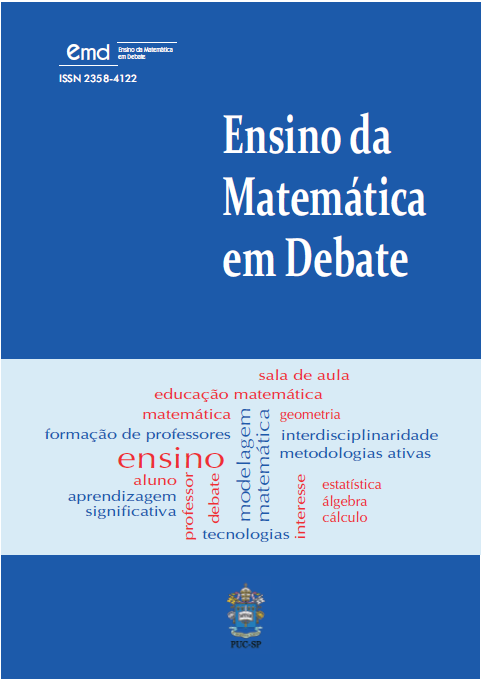DIFERENÇAS NA PRÁTICA DOCENTE DE DOIS PROFESSORES – NOVOS E ESPECIALISTAS – AO PROMOVER A CONSCIÊNCIA: uma análise sociocultural por meio do uso de recursos
Palavras-chave:
Uso de recursos, gestos, artefatosResumo
Este artigo apresenta alguns resultados de uma investigação mais ampla que analisa a prática de dois professores – novos e especialistas – da rede de teorias. Dessa forma, um quadro conceitual é projetado que aborda os componentes epistemológicos e didáticos da prática do professor. Assim, são incorporadas noções tanto da teoria da objetivação (TO) quanto da Abordagem Documentária da didática (ADD). Os dados apresentados e analisados correspondem às transcrições das gravações em vídeo de dois professores de Física do 11º ano (novato e expert), em situações de ensino originais. A discussão dos resultados visa determinar como a prática de cada professor difere do uso de recursos (físicos e conceituais) e meios semióticos de objetivação, com o objetivo de promover a conscientização do significado dos conceitos. Os resultados revelam diferenças significativas em ambos os professores na maneira como eles usam recursos e em como os significados são produzidos na sala de aula.
Referências
APPLETON, K. Analysis and Description of Students' Learning during Science Classes Using a Constructivist‐Based Model. Journal of Research in Science Teaching, v. 34 n. 3, 1997, p. 303-318.
BAYRAKTAR, S. Misconceptions of Turkish pre-service teachers about force and motion. International Journal of Science and Mathematics Education, v. 7 n. 2, 2009, p. 273-291.
BERLINER, D. C. Describing the Behavior and Documenting the Accomplishments of Expert Teachers. Bulletin of Science, Technology & Society, v. 24 n. 3, 2004, p. 200-212.
GUEUDET, G.; TROUCHE, L. Towards new documentation system for mathematics Teachers? Educational Studies in Mathematics, v. 71, 2009, p. 199-218.
GUEUDET, G.; TROUCHE, L. Teachers´work with resources: Documentational geneses and professional geneses. In: GUEUDET, G.; PEPIN, B.; TROUCHE, L. From text to ´lived´resources: Mathematics curriculum materials and teacher development. New York: Springer, 2012, p. 189-213.
GOMEZ-ZWIEP, S. Elementary Teachers’ Understanding of Students’ Science Misconceptions: Implications for Practice and Teacher Education. Journal of Science Teacher Education, v. 19 n. 5, 2008, p. 437-454.
KARAM, R. Introduction of the Thematic Issue on the Interplay of Physics and Mathematics. Science and Education, v. 24, 2015, p. 487-494.
KAUR, B.; HO, W.K.; TOH, T.L.; CHOY, B.H. (Eds.). Proceedings of the 41st Conference of the International Group for the Psychology of Mathematics Education (Vol. 4). Singapore: PME. 2017.
KIDRON, I.; BIKNER-AHSBAHS, A. Advancing Research by Means of the Networking of Theories. Approaches to Qualitative Research in Mathematics Education. Springer Netherlands, 2015, p. 221-232.
MORENO-ARMELLA, L; SRIRAMAN, B. Symbols and Mediation in Mathematics. In: SRIRAMAN, B.; ENGLISH, L. English. Theories of Mathematics Education: Seeking New Frontiers. Springer, 2010, p. 211-232.
PIAGET, J. Introducción a la epistemología genética: el pensamiento físico. Buenos Aires: PAIDOS, 1979.
PONTE, J. P.; CHAMPAN, O. Mathematics teachers knowledge and practices. In: GUTIERREZ, A.; BOERO, P. Handbook of research on the psychology of mathematics education: Past, present and future. Rotterdam, The Netherlands: Sense Publishing, 2006, p. 461-494.
PREDIGER, S.; BIKNER-AHSBAHS, A.; ARZARELLO, F. Networking strategies and methods for connecting theoretical approaches: first steps towards a conceptual framework. ZDM, v. 40, n. 2, 2008, p. 165-178.
RADFORD, L. Sujeto, objeto, cultura y la formación del conocimiento. Educación Mathemática, v. 12 n. 1, 2000, p. 51-69.
RADFORD, L. The ethics of being and knowing: Towards a cultural theory of learning. In: RADFORD, L.; SCHUBRING, G.; SEEGER, F. Seeger. Semiotics in mathematics education: epistemology, history, classroom, and culture. Rotterdam: Sense Publishers, 2008, p. 215-234.
RADFORD, L. De la teoría de la objetivación [On the theory of objectification]. Revista Latinoamericana de Etnomatemática, v. 7, n. 2, 2014a, p. 132-150.
RADFORD, L. On teachers and students: An ethical cultural-historical perspective. In: LILJEDAHL, P.; NICOL, C.; OESTERLE, S.; ALLAN, D. Proceedings of the Joint Meeting of PME 38 and PME-NA 36 (Plenary Conference) Vol. 1. Vancouver: PME, 2014b, p. 1-20.
RADFORD, L. On the role of representations and artefacts in knowing and learning. Educational Studies in Mathematics, v. 85 n. 3, 2014c, p. 405-422.
RADFORD, L. The epistemological foundations of the theory of objectification. Isonomia, 2015, p. 127-149.
RADFORD, L.; ROTH, W. M. Intercorporeality and ethical commitment: An activity perspective on classroom interaction. Educational Studies in Mathematics, v. 77 n. 2-3, 2011, p. 227-245.
ROBINSON, N.; EVEN, R.; TIROSH, D. How teachers deal with their students’ conceptions of algebraic expressions as incomplete. In: PONTE, J. P.; MATOS, J. F. Proc. 18th of the Int. Group for Psychology of Mathematics Education Vol. 4. Lisbon: PME, 1994, p. 129-136.
ROLKA, K.; RÖSKEN, B.; LILJEDAHL, P. The role of cognitive conflict in belief changes. In: WOO, J. H; LEW, H. C.; PARK, K. S.; SEO, D. Y. Proc. 31st Conf. of the Int. Group for the Psychology of Mathematics Education Vol. 4. Seoul: PME, 2007, p. 121-128.
SFARD, A. What could be more practical than good research?: On mutual relations between research and practice of mathematics education. Educational Studies in Mathematics, v. 58, 2005, p. 393-413.
Downloads
Publicado
Como Citar
Edição
Seção
Licença

Este obra está licenciado com uma Licença Creative Commons Atribuição 4.0 Internacional.





